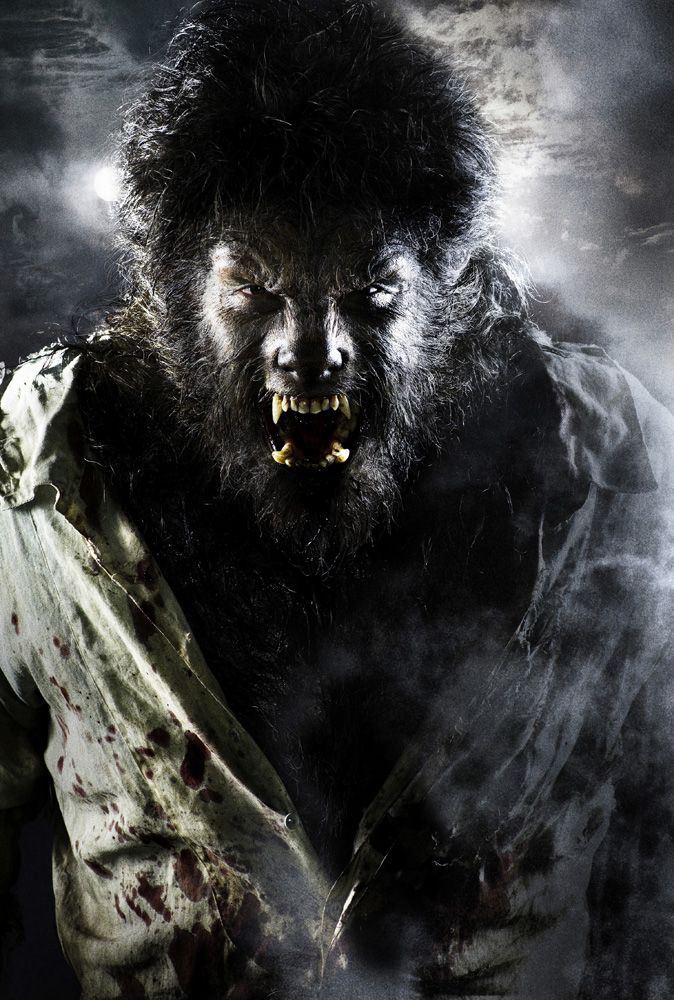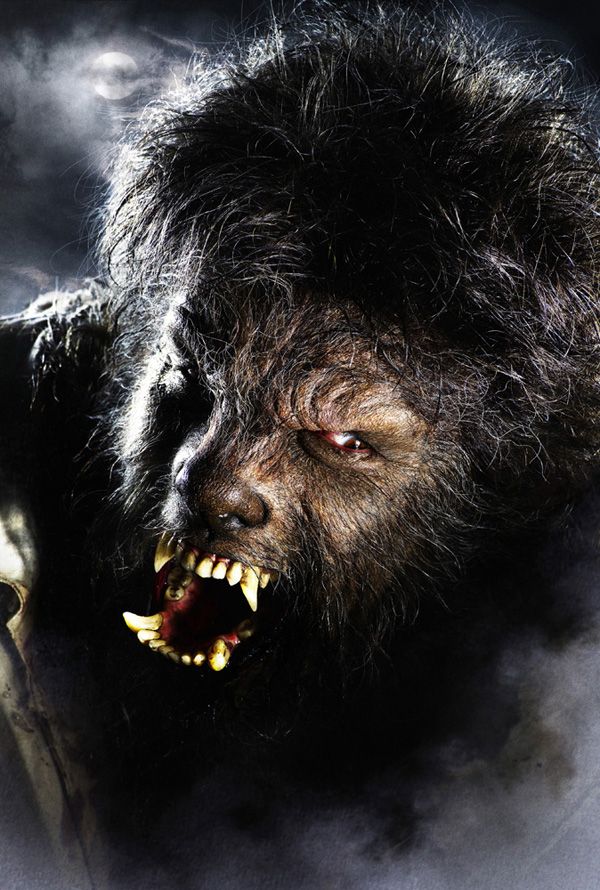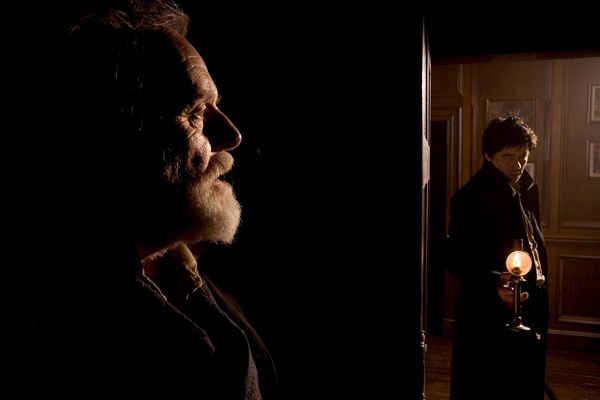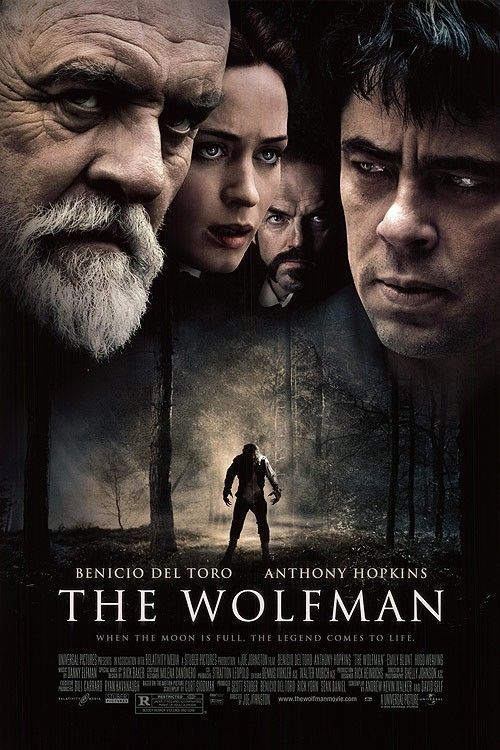While Benicio del Toro has been working in Hollywood for over two decades, I've always considered him an enigma. That's because while he works in big name films like Che, Fear and Loathing in Las Vegas, 21 Grams, and the soon to be released Wolfman, he rarely does press, so all that's known about this great actor is what's on screen. But with his leading role in Wolfman, del Toro was out doing press this weekend and I was able to participate in a press conference with the talented actor.
During the interview, del Toro talks about his love of monster movies as a kid, how he was the one who proposed making the film to Universal, why he wanted to wear the makeup and not just use CG, and what winning the Oscar meant. It's a great interview with this mysterious actor. Hit the jump to read it:
As always, you can either read the transcript below or listen to the audio by clicking here. And if you'd like to watch some movie clips from The Wolfman, click here.
-
Question: Assuming the role of producer, was it just practical or could you shepherd a remake of a movie you really loved as a kid?
BDT: Well, yeah, it was a little bit of both. We proposed the idea, it was Rick Yorn and myself. We went up to the studio and proposed the idea of doing a remake of the original Wolfman movie with the intention of really paying homage to those Universal classic horror movies like Frankenstein. By that I mean by paying homage is to stay close to the story, to also have the makeup be a big component, have the actor in the makeup being a big part of the movie and they liked the idea. I think Andrew Kevin Walker came in and then Rick Baker came in and we were moving. I'm a big fan of all these horror movies. As far back as I can remember, these are the first movies, the Universal horror movies where I knew the title of the film and I also knew the names of the actors in those films. I think I knew that before Chitty Chitty Bang Bang or Dr. Dolittle. These are the movies that I grew up watching. I'm talking four, five, six, seven years old.
How has it been to open doors for other Latin American actors with your talent?
BDT: What does it mean? Well, if I do, it means the world, no pun intended, the Universal logo. Well, when I came to Hollywood, there were three names really of Latin actors, three or four names, maybe five. There was Raul Julia, Edward James Olmos, Andy Garcia, Antonio Banderas, Jimmy Smits. Now there's a lot. I think now there's more filmmakers, more writers, more directors, a lot of them coming from Mexico or Spain. They've managed to make movies in Hollywood that take hold so I wouldn't say it's only me. I think there's a whole generation of Latinos but it's changed quite a bit since I started. I think Hollywood, not only Universal, but I think Hollywood is a little bit more world-like. There's more people coming from different parts of the world I think now than ever. Not only Latinos but a couple years ago, a French actress won the Best Actor. Just a lot from different parts of the world, so I think it's good. It brings it back to like the silent movie era where there were a lot of different directors from all over the world, and actors from all over the world, just doing Hollywood pictures.
Who turned you onto those horror movies, and were you also interested in Silence of the Lambs and those kinds of films?
BDT: It was my cousins. They were older but what I think, and these movies were way beyond their time too, but I think what happens is like sometime in the '60s, early '60s, there was a throwback to those horror movies. What I remember, and this through my cousins, there was a magazine called Famous Monsters. That magazine was in my house as far back as I remember. The movies actually that I saw when I first saw The Wolfman or Dracula or the Bride of Frankenstein were, this is before VHS, before DVD, before Blu Ray, before cable TV really, they were Super8. These Super8 films started kind of sometime in the '60s and then the other thing that I remember as a child were these model kits which you get the model of Frankenstein or King Kong and you glue it together and you painted it. I think it was a great pacifier for kids. Some of them were really gory. I remember the model of Bride of Frankenstein, you had to paint like the limb, a brain. They were really cool toys. They were made by Aurora was the company, a company based in Illinois. The movies were made by a company named Castle Films. So I think there was a throwback in the '60s before my time and I came in towards the end of that because the kids that I grew up with didn't have older cousins. They didn't have that connection to the monsters who were my age. I got the tail end of it and I remember some of these model kits, they didn't make them anymore when I was growing up and I would dream about my cousin had The Bride of Frankenstein and that was like the cool one to have. I'd have dreams about this model toy because they had it and I didn't have it.
Were you a fan of Silence of the Lambs?
BDT: Yeah, Jaws, I remember seeing Jaws when it first came out, but the Silence of the Lambs, Halloween, I like all kinds of movies but I like some of those horror movies a lot too. Silence of the Lambs of course because of Sir Anthony Hopkins.
What's your opinion on CGI and your process of convincing the studio to use makeup?
BDT: When you have Rick Baker dying to do it, you don't have to do much convincing. I don't think the studio had any problems with Rick Baker doing the makeup. Well, I think that CGI can enhance a picture. I think it enhances this one. The transformation, CGI helps. Regarding green screen, green screen is really like doing some stage work. You have to make believe that there is a window, make believe that something is there that is really not there and convince the audience. It's part of acting. So I don't have a problem with green screen. I mean, I did a movie called Sin City that was all done on green screen and I kind of had fun. I have fun in everything I do except this [press]. The makeup is Rick Baker. I keep mentioning that name but see, the thing with those horror movies from the '20s and Lon Chaney, Sr. and Frankenstein, The Bride of Frankenstein, The Wolf Man, those movies, the makeup artist in a lot of those movies was a guy named Jack Pierce. Part of the attraction to these monsters was not only were they scary, but they were cool. They were really cool. Frankenstein is a cool makeup. I mean, Boris Karloff is fantastic in the makeup but the makeup was also cool. That's something that I think Rick Baker understands more than anyone. We had a couple meetings with Rick Baker about this, it was like we were really on the same page. Rick Baker, what do you do, you turn into a canvas, let him paint all over your face. The only problem is taking it off. It takes about two hours and we could say it's painful. At some point I stopped liking Rick Baker during the process of taking it off, but then next time he comes around, he starts putting it on, fall in love with him again. It's a love hate relationship.
How much did it transform your life and career to win an Oscar?
BDT: I remember a lot about that day but I think a lot. I don't know if I'd be here without that Oscar to be honest with you. There's something about the Oscar that gives you sort of stripes where you feel you can dare to walk into a studio like Universal and say, "Hey guys, how about an idea of me playing the wolf man?" I think that the Oscar gives you some kind of guts or something, it gives you the illusion that you can do it. It's good for business.
Did you relate to Talbot's struggle to be an actor when his father didn't want him to?
BDT: Yeah, I've heard a lot of people saying oh, this is a biopic of my life. You know what they say about Puerto Ricans, right, on a full moon? You know what they say?
What?
BDT: I'll show you later. But no, it's like there's elements here but the elements of the actor in this picture was done by Andrew Kevin Walker. Making my character into an actor in the movie is kind of subtle but he's doing Hamlet. Hamlet in the play, he is on a journey of revenge to take down his uncle who killed his father. So Andrew Kevin Walker put Lawrence Talbot into an actor who when he goes home and he tries to investigate what happened to his brother, he finds out it's his father and then he's got to do a journey similar to Hamlet to break the chain. So that's the idea. It wasn't like hey man, I'm an actor, my dad blah blah blah, my dad was a tough, strict guy but also my dad was present. I did go away to school but my dad was present. I had breakfast and dinner with my dad every day. That's not the case with Lawrence Talbot.
How was the day you told him you're an actor?
BDT: That day was when I won the Oscar. I didn't have to tell him anything.
Working with Joe Johnston?
BDT: Yeah, well, at the beginning of this film we had a different director. It was going to be Mark Romanek. Two weeks into preproduction, at some point in preproduction, Mark Romanek stepped out and we had no director. The movie was already rolling and the character of Lawrence Talbot, which I had been talking to Mark Romanek and we'd been working together, Andrew Kevin Walker, the character of Lawrence Talbot was a little bit darker. It was a bit violent. There was a moment in which he tries to drink to someone. He was an actor. He was more of a reluctant hero if anything. Then Joe Johnston came in. We had a meeting with him. We had to decide on a director fairly quick and he was ballsy enough to jump in and take the helm of this picture that was already moving and we're very grateful for him for doing that. So when he came in, that angle that we had on Mark Romanek started to change a little bit. I think it was Joe Johnston's idea basically to keep him a little bit more on the noble side or being more of a noble character, more we could say straight up or straightforward type of character. I thought that was a good idea, especially for these movies because there's already so many different levels to the movie. You don't want to get too confused here and just make a movie about - - it's a fantasy movie. You don't want it to turn into just a drama. So Joe came in and we started working in that direction. He was willing to explore things. As an actor, you go up to the director and you ask him, "Hey, how about if I do this or if I do that?" And he was very collaborative I think with all the actors. With me he allowed me to explore this or that and it worked out. So I enjoyed working with him.
What was your creative process on the story itself? Did you ever incorporate the pentagram?
BDT: The pentagram, I don't know if we played with that. We talked about maybe that the bite, as it was healing, it made a pentagram but it didn't go in that direction. We wanted to keep the basis of the film, of the original there. Basically, the fact that there's - - it's a good question also for the writer but when Andrew Kevin Walker came in, we gave him the ball. Just run with it. When he came back with this darker story between father and son and the Hamlet thing, I thought that was very cool. But he kept the silver bullet, the full moon and also the fact that the silver bullet will take him down which I think is important for this movie. The monster, once you put a silver bullet in him, that's it. We didn't want to have the monster like - - we wanted to have an end to the curse or the monster or whatever. So what else did we want to keep? The thing that Andrew Kevin Walker did that I also liked was that Lawrence Talbot would be more active. I think in the original, he's a little bit more of a victim. In our version, he acts and he kind of like fights back. He almost becomes a detective but those were things that we wanted to keep, and the fact that he comes from the states making it easier for me so I don't have to speak with an English accent. What else did we - - the relationship with Gwen too, get closer a little bit more than the original. I don't mind that either. Emily Blunt, I don't mind getting close to Emily Blunt. So those were things that the writer, when he took the ball and he tossed it back our way, that I personally liked for a remake.
Were the asylum scenes also a collaboration, and how important is it for an actor to own their own madness?
BDT: All the asylum stuff, yeah, what can I say? The asylum sequence was difficult to do but I always wonder, wait, this guy is covered in blood and he gets arrested. So they can pin all the murders. So the idea of the asylum is we're going to prove that he's not a werewolf and then we're going to like hang him or whatever, so it's kind of like a trial. The idea that they're vicious to him in the asylum, I really thought that it would work. My approach to it and the collaboration, some of those things, Joe Johnston for example believed that there should be a moment with the electroshocks which started to happen around that time. The water boarding was there already. That was tough to do because I was really actually strapped to that chair and as you're dunked backwards, it's supposed to be ice cold water. They used to do it back then. Maybe they still do it. My approach to it was I've been thrown in ice cold water and the instinct is to scream. All the senses just go like, [pow]. So I decided I'll scream which was a choice but I didn't know what that meant, which means if you're going upside down, I learned this the hard way, when you're going upside down as you're screaming, your mouth is open and you're screaming so you're letting most of your air out and you're upside down, you get clogged with water right here [in his sinuses]. As you're coming back up, now you're out of air and you can only exhale. You can't [sniff], you can only AGHHH but if you try to bring it in, it's just all clogged in here. I was lucky to have a good set of stunt guys around which we worked a sign. If something happened, I would make a sign, they'd jump in, undo me and I'd just roll over so I could - - and we had to do that once. It got to the point where I couldn't breathe. I panicked for a second and just made the sign. The sign was maybe, I couldn't even move my head because I'm strapped here too. So it was like I don't remember the sign but we had a sign. Maybe it was with the hand or whatever and they jumped in and unhooked me. So that was kind of difficult but looking at the result, I think it worked. And the collaboration with Joe, I remember that we talked about the idea of injecting him with some kind of drug, unknown drug and he played it out so that I'm not that coherent and give it a sense of the hallucination kind of a sense, a sense of the dream, a sense of which in the original there were these nightmares he was having. So all that stuff was incorporated in that asylum scene which I thought it did work. I remember the scene in which Emily's character, the vision of Emily's character comes into the cell and there's the mirror. I remember sitting there with Joe and I said, "Why don't we get the werewolf behind me to pop up too?" So we collaborated a lot with that sequence and some of it worked.
Did you practice howling?
BDT: No, I never did any howling because you know, it's very hard to do the howling with the teeth. You can't get your mouth around it. It's like having a spoon, a plastic spoon in your mouth and trying to talk.
How do you feel about Rick Baker saying you're already a wolf man?
BDT: I am.


.jpg)
.jpg)
.jpg)


.jpg)

